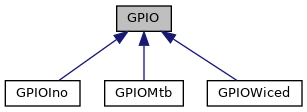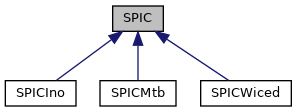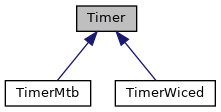
Data Structures | |
| class | GPIO |
| class | SPIC |
| class | Timer |
| class GPIO |

Public Types | |
| enum | Error_t { OK = 0 , INTF_ERROR = -1 , CONF_ERROR = -2 , READ_ERROR = -3 , WRITE_ERROR = -4 } |
Interrupt event | |
| enum | IntEvent_t { INT_FALLING_EDGE = 0 , INT_RISING_EDGE = 1 } |
Voltage level | |
| enum | VLevel_t { GPIO_LOW = 0 , GPIO_HIGH = 1 } |
Voltage logic | |
| enum | VLogic_t { NEGATIVE = 1 , POSITIVE = 2 } |
Public Member Functions | |
| virtual Error_t | init ()=0 |
| Initializes the GPIO. More... | |
| virtual Error_t | deinit ()=0 |
| Deinitializes the GPIO. More... | |
| virtual Error_t | changeMode (uint8_t mode)=0 |
| Changes the IN/OUT mode. More... | |
| virtual VLevel_t | read ()=0 |
| Reads the GPIO voltage level. More... | |
| virtual Error_t | write (VLevel_t level)=0 |
| Writes the GPIO output voltage level. More... | |
| virtual Error_t | enable ()=0 |
| Enables the GPIO output according to the GPIO logic. More... | |
| virtual Error_t | disable ()=0 |
| Disables the GPIO output according to the GPIO logic. More... | |
| Error_t | checkErrorStatus () |
| enum GPIO::Error_t |
| enum GPIO::IntEvent_t |
| enum GPIO::VLevel_t |
| enum GPIO::VLogic_t |
|
pure virtual |
|
pure virtual |
|
pure virtual |
|
pure virtual |
|
pure virtual |
|
pure virtual |
| GPIO::Error_t GPIO::checkErrorStatus | ( | ) |
| class SPIC |

Public Types | |
| enum | Error_t { OK = 0 , INTF_ERROR = -1 , CONF_ERROR = -2 , READ_ERROR = -3 , WRITE_ERROR = -4 } |
Public Member Functions | |
| virtual Error_t | init ()=0 |
| Initializes the SPIC. More... | |
| virtual Error_t | deinit ()=0 |
| Deinitializes the SPIC. More... | |
| virtual Error_t | triggerUpdate ()=0 |
| Sends a trigger through out the SPI bus. More... | |
| virtual Error_t | sendReceive (uint16_t *sent_data, uint16_t size_of_sent_data, uint16_t *received_data, uint16_t size_of_received_data)=0 |
| Function which allows 3wire SPI (SSC) by sending and receiving data in the same function. More... | |
| Error_t | checkErrorStatus () |
| enum SPIC::Error_t |
|
pure virtual |
|
pure virtual |
|
pure virtual |
|
pure virtual |
Function which allows 3wire SPI (SSC) by sending and receiving data in the same function.
| sent_data | pointer two 2*unit16_t value for one command word and one data word if something should be written |
| size_of_sent_data | the size of the command word default 1 = only command 2 = command and data word |
| received_data | pointer to data structure buffer for the read data |
| size_of_received_data | size of data words to be read |
| OK | if success |
| INIT_ERROR | if transfer fails |
| SPIC::Error_t SPIC::checkErrorStatus | ( | ) |
| class Timer |

Public Types | |
| enum | Error_t { OK = 0 , ERROR = 1 } |
Public Member Functions | |
| virtual Error_t | init ()=0 |
| Initialize the timer. More... | |
| virtual Error_t | deinit ()=0 |
| Deinitialize the timer. More... | |
| virtual Error_t | start ()=0 |
| Starts the timer. More... | |
| virtual Error_t | elapsed (uint32_t &elapsed)=0 |
| Elapsed time since the timer was started. More... | |
| virtual Error_t | stop ()=0 |
| Stops the timer. More... | |
| virtual Error_t | delayMilli (uint32_t timeout)=0 |
| Introduces a delay during the specified time. More... | |
| virtual Error_t | delayMicro (uint32_t timeout)=0 |
| Introduces a delay during the specified time. More... | |
| enum Timer::Error_t |
|
pure virtual |
Initialize the timer.
| OK | if success |
| INIT_ERROR | if hardware interface error |
Implemented in TimerWiced, and TimerMtb.
|
pure virtual |
Deinitialize the timer.
| OK | if success |
| INIT_ERROR | if hardware interface error |
Implemented in TimerWiced, and TimerMtb.
|
pure virtual |
Starts the timer.
| OK | if success |
| INIT_ERROR | if hardware interface error |
Implemented in TimerWiced, and TimerMtb.
|
pure virtual |
Elapsed time since the timer was started.
| [out] | elapsed | Time in milliseconds |
| OK | if success |
| INIT_ERROR | if hardware interface error |
|
pure virtual |
Stops the timer.
| OK | if success |
| INIT_ERROR | if hardware interface error |
Implemented in TimerWiced, and TimerMtb.
|
pure virtual |
Introduces a delay during the specified time.
| [in] | timeout | Delay time in milliseconds |
| OK | if success |
| INIT_ERROR | if hardware interface error |
Implemented in TimerWiced, and TimerMtb.
|
pure virtual |
Introduces a delay during the specified time.
| [in] | timeout | Delay time in microseconds |
| OK | if success |
| INIT_ERROR | if hardware interface error |
Implemented in TimerWiced, and TimerMtb.